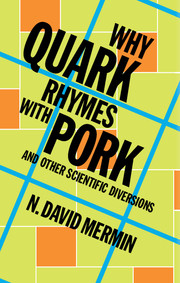Book contents
- Frontmatter
- Dedication
- Contents
- Preface
- Part One Reference Frame Columns, Physics Today 1988–2009
- Part Two Shedding Bad Habits
- 31 Fixing the shifty split, Physics Today, July 2012
- 32 What I think about Now, Physics Today, March 2014
- 33 Why QBism is not the Copenhagen interpretation, lecture, Vienna, June 2014
- Part Three More from Professor Mozart
- Part Four More to be Said
- Part Five Some People I've Known
- Part Six Summing it Up
- Index
31 - Fixing the shifty split, Physics Today, July 2012
from Part Two - Shedding Bad Habits
Published online by Cambridge University Press: 05 January 2016
- Frontmatter
- Dedication
- Contents
- Preface
- Part One Reference Frame Columns, Physics Today 1988–2009
- Part Two Shedding Bad Habits
- 31 Fixing the shifty split, Physics Today, July 2012
- 32 What I think about Now, Physics Today, March 2014
- 33 Why QBism is not the Copenhagen interpretation, lecture, Vienna, June 2014
- Part Three More from Professor Mozart
- Part Four More to be Said
- Part Five Some People I've Known
- Part Six Summing it Up
- Index
Summary
Quantum mechanics is the most useful and powerful theory physicists have ever devised. Yet today, nearly 90 years after its formulation, disagreement about the meaning of the theory is stronger than ever. New interpretations appear every year. None ever disappear.
Probability theory is considerably older than quantum mechanics and has also been plagued from the beginning by questions about its meaning. And quantum mechanics is inherently and famously probabilistic.
For the past decade, Carl Caves, Chris Fuchs, and Rüdiger Schack have been arguing that the confusion at the foundations of quantum mechanics arises out of a confusion, prevalent among physicists, about the nature of probability [1]. They maintain that if probability is properly understood, the notorious quantum paradoxes either vanish or assume less vexing forms.
Most physicists have a frequentist view of probability: Probabilities describe objective properties of ensembles of “identically prepared” systems. Caves, Fuchs, and Schack take a personalist Bayesian view: An agent assigns a probability p to a single event as a measure of her belief that the event will take place [2].
Such an agent is willing to pay less than $p for a coupon that will pay her $1 if the event happens, and she is willing to underwrite and sell such a coupon for more than $p. Surprisingly, the standard rules for probability follow from the requirement that an agent should never face certain loss in a single event. (For example, if p exceeded 1, she would pay more than $1 for a coupon that returned at most $1; if p were negative, she would pay somebody to take a coupon from her that might cost her another $1.) Avoiding certain loss is the only constraint on an agent's probability assignments. The probability of an event is not inherent in that event. Different agents, with different beliefs, will in general assign different probabilities to the same event.
The personalist Bayesian view of probability is widely held [3], though not by many physicists. It has profound implications for the meaning of quantum mechanics, which Fuchs and Schack call quantum Bayesianism—QBism for short. Since quantum states determine probabilities, if probabilities are indeed assigned by an agent to express her degree of belief, then the quantum state of a physical system is not inherent in that system but assigned by an agent to encapsulate her beliefs about it. State assignments, like probabilities, are relative to an agent.
- Type
- Chapter
- Information
- Why Quark Rhymes with PorkAnd Other Scientific Diversions, pp. 219 - 226Publisher: Cambridge University PressPrint publication year: 2016



